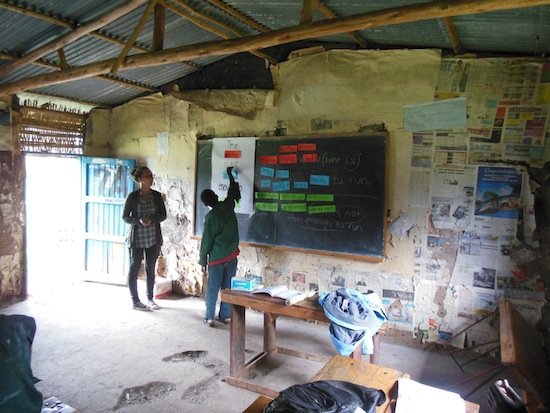So, You Wanna Teach English Abroad?


You want to do something worthwhile. You want to travel for an extended time, and you want to immerse yourself in a culture so very different from your own.
What better way to do all of the above than to volunteer abroad? And what better way to do that than to teach English abroad? Because it’s something you can do without much, if any, training. Because you grew up speaking English, and people all over the world are learning English, as it’s considered a vital skill for getting a job in developing countries. You went to school for Russian Literature, Media Studies, or International Business–things you can’t really use to teach an everyday person something tangible that they can use in their everyday life.
So you decide the best way you can help others is by teaching. Because everyone needs to learn, and you went to school, so you have plenty of experience with how to keep a class interested, the most entertaining way to teach conjunctions–yay train cars!–if there even is such a thing, and how to catch cheaters.
So, You Wanna Teach English Abroad?
You pack your bags, crawl out of a packed bus, and find yourself in the middle of nowhere surrounded by a dust storm and hundreds of people who have never seen a real, live, native English speaker before, let alone have tried to communicate with one. You know you’re in the right place. These people need to work on their English language skills.
But the more time you spend in your community, the more you realize how very, very few of them will ever end up leaving their little town, or even their country for that matter. Sure, they should learn English to communicate with the one ferenj who comes to town on a solo backpacking tour of self-discovery, but why accommodate that one person, when really, the backpacker should learn to communicate in the language of the people he is immersing himself in.
And then there’s your school. The teachers have been there for ages. For longer than you’ve even been alive, longer than you were even a possibility of a happening between two people. They have wisdom, and experience, and they’ve seen it all. You used to think you had had so many humbling, learning experiences that made you so wise, but that pales in comparison to half the life these teachers have lived. How likely are they to change their methods? How likely are you going to be able to show them something new, that they, in their stubborn collection of years, will alter their routines to incorporate into their teaching?
And then there’s your school.
Very few, if any, will be inspired by you. Very few, if any, will change the way they teach.
So what can you do? How can you feel useful in the midst of a system so backwards that any significant change would take a total overhaul of the entire education system, from teaching colleges, to teachers, to schedules, to payment methods, to textbooks, to school funding, to school facilities?
You can teach English abroad the way you learned it to as many kids as you can. Because you learned grammar and persuasive arguments, yes, but what you really learned was self-reliance. What you really learned was how to think for yourself and how to be creative and imaginative. You learned to think outside of the box and to develop original ideas. You learned respectful ways to challenge what you learned and to break the mold. In fact, you learned to be inspired by people with passions for reading and writing. It only takes one teacher to inspire a kid to grow up to be a similar inspiration, a similar breath of fresh air, a similar free thinker desperate to share his/her perspectives with the world.
So even if no one else learns from you, you can be that one teacher to a classroom, to even a small group of students, to even one child who learns that they can be different from what their society and culture tells them they must be limited to.
Just make sure it’s one that someone will remember.
And even if very few other teachers take notice of what you do, all you need is one to continue what you started in the short time you had.
It won’t be easy, and it won’t always be fun. It will be discouraging and it will be degrading at times. But you must never sacrifice your intent and your original motivation. Maybe you just need to re-adjust and re-focus your energy. Because not only are you improving yourself, but you can give courage to the students sitting in the back. You can make others listen to them, and you can encourage them. You can show them that they are unique and special and that their ideas are worth something and deserve to be heard, even if it’s just you reading something they wrote down.
“The powerful play goes on and you may contribute a verse.” Just make sure it’s one that someone will remember. And someone will, I promise you.








